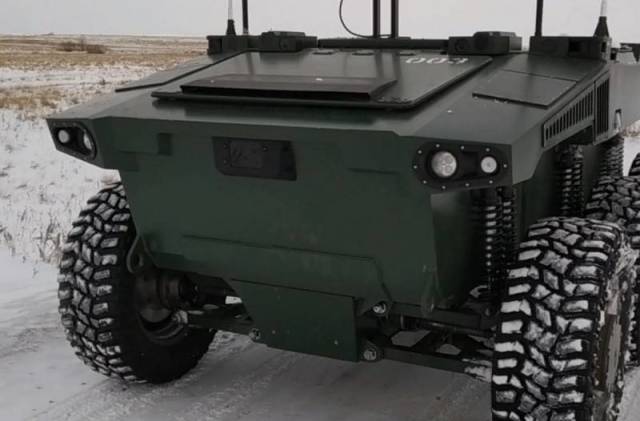As reported on December 30, 2020 by the Russian Foundation for Advanced Research, the experimental robotic wheeled platform "Marker"in fully autonomous mode overcame a 30-kilometer stretch of road. The tests were conducted in the Chelyabinsk region.

Prototype of the experimental robotic wheeled (6x6) platform "Marker" during tests in fully autonomous mode in the Chelyabinsk region, 2020 (c) Advanced Research Foundation
The route of the car was laid through an unprepared territory-forest-steppe with snow cover. System offline motion control platform, having received the routing task with the coordinates of the given point, provided the arrival platform to the finish line an hour and a half, based on data from the vision system is built on a new neural network algorithms. The platform's autonomous motion control system provides autonomous routing and route correction in the event of obstacles - trees, climbs, ravines, shrubs, etc.
The technical characteristics of the platform provide the possibility of autonomous operation for up to 48 hours on paved roads and up to 24 hours on rough terrain. As part of the next tests, the Marker platform will have to overcome the path segments of 50, 100 and 200 kilometers.
The experimental robotic platform "Marker" was developed within the framework of the project of the Foundation for Advanced Research, which started in 2018. The goal of the project is to create and conduct a full-scale development of technologies and basic elements of ground-based robotics.
On the part of bmpd, we recall that the project of the experimental robotic platform "Marker "has been implemented since March 2018 by the National Center for the Development of Technologies and Basic Elements of Robotics of the Foundation for Advanced Research and the NGO"Android Technology". At the first stage, two prototypes of tracked platforms were worked out. It was reported that " the work provides for two types of platforms: tracked and wheeled. Five robotic complexes will be manufactured to test the technologies."
With the use of the platform, technologies for automatic routing and autonomous traffic control are being developed in urban areas and on rough terrain. When the platform moves, its functional systems automatically make adjustments to the route, taking into account the stationary and mobile obstacles detected by the sensors.
The autonomy of the platforms is provided by a modular multispectral system of technical vision, data processing in which is carried out by the most modern neural network algorithms. The platform receives full awareness of the surrounding space at a distance of more than a hundred meters, which makes it possible to adjust the movement in a timely manner under the control of the operator without his direct intervention.
